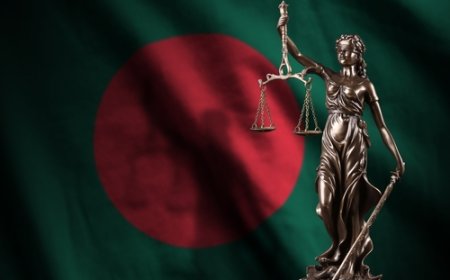The Rise and Fall of Obaidul Quader
The Reappearance of the Once All-Powerful AL General Secretary Paints a Portrait of Moral Bankruptcy and Political Cowardice

Obaidul Quader's recent interview -- delivered in a fatigued, disconnected voice over a scratchy telephone line -- marks a desperate attempt by a disgraced man to reclaim relevance. For nine long months, the former General Secretary of the now-banned Awami League remained hidden from public view. His sudden reappearance through an interview with an online Indian outlet raises more questions than it answers. This is not a comeback: it's a confession dressed in cowardice.
A Study in Collapse: The Psycho-Profile of a Fallen Strongman
Listening to the interview, one can sense a man psychologically cornered, politically irrelevant, and morally bankrupt. There is a striking duality in his speech -- a mixture of victimhood and arrogance. On one hand, he portrays himself as a frail old man with health concerns who had to escape for survival. On the other, he still tries to rationalize the actions of a regime that blatantly stole elections, muzzled dissent, and brutalized its own citizens.
This contradiction lies at the heart of Quader’s personality. His lifelong loyalty to a leader-centric, dynasty-driven politics has rendered him incapable of true self-reflection. His justifications for the 2018 "midnight election" and the 2024 sham vote reveal a man either delusional or entirely detached from democratic norms. Worse, when asked whether he and his party had erred, he deflects. Instead of contrition, he offers excuses.
Quader’s statement that “opinion polls today still favour Sheikh Hasina” was particularly absurd -- an unsubstantiated claim in a country where press freedom was choked and polls rigged. His notion of democracy is not based on public consent, but on state-engineered loyalty.
Betrayal of the Foot Soldiers -- and Those Who Spared Him
Perhaps the most damning part of the interview is how casually Quader recounts being rescued during the August 5 uprising -- not by loyalists, but by revolutionary student protesters who had every reason to see him as a symbol of oppression. These were not party cadres or allies; they were his political adversaries, part of the very movement that toppled his regime. Yet, in a moment that revealed the moral high ground of the uprising, they chose to spare his life, smuggling him out in disguise to safety.
What followed is a bitter irony. While these young revolutionaries upheld humanity, Quader -- through his years in power -- had done everything to crush such idealism. For over a decade, he stood at the center of a party machinery that criminalized dissent, empowered kleptocrats, and turned law enforcement into a private militia. Under his watch, student and youth wings were militarized, opposition was demonized, and democracy was hollowed out.
His silence on the fate of those who resisted his regime -- many of whom were arrested, tortured, or disappeared -- is not just cowardly. It is emblematic of his entire political career: exploit, escape, and erase.
Why Has He Surfaced Now?
The timing of his sudden re-emergence is telling. With war crimes trials underway, tribunal proceedings detailing the Gang of Four's hardline push to crush the uprising, and damning evidence surfacing regarding Hasina’s last hours in power -- Quader is not clarifying, he is covering tracks.
There are four likely reasons for this resurfacing:
Narrative Reclamation: Quader wants to spin his image before tribunal testimonies and leaked transcripts brand him as one of the chief architects of state brutality.
Factional Positioning: The power vacuum within Awami League’s remnants could be prompting him to signal his relevance to disillusioned cadres.
Foreign Assurances: His choice of Indian media and repeated mention of India as a “friend” suggests that this appearance was coordinated, possibly to test waters for soft rehabilitation through external actors.
Legal Buffering: By making public statements of justification and victimhood, he may be preparing a defense narrative in anticipation of future war crimes indictments.
The Face of Hypocrisy and Gaslighting
What makes Quader’s performance especially grotesque is his insistence that "no regrets" are necessary. His tone is one of gaslighting -- claiming that the atrocities under their watch were necessary for development, that criticisms are biased, and that journalists questioning him are themselves partisan.
He even goes as far as threatening Nazmus Sakib indirectly, stating that people like them “won’t be allowed to remain in Bangladesh” if his party returns to power. This chilling threat is emblematic of his style -- dictatorial, thin-skinned, and authoritarian. It proves that his commitment is not to the nation, but to the perpetuation of a corrupt political cartel.
The Man Who Dragged a Dynasty Down
If there is one figure besides Sheikh Hasina herself who personifies the decay of the Awami League’s credibility, it is Obaidul Quader. He was not a passive bystander. He was a planner, a cheerleader, and an enforcer of a regime that suffocated the voice of the people. His decisions led to massacres, to stolen futures, and to the moral collapse of the largest political party.
Now, exposed and adrift, he seeks to rewrite history. But no amount of interviews can change the truth. His actions speak louder. He let his party workers down. He let the people down. And he ensured that when the Awami League finally collapsed under its own weight, it did so without honour.
Bangladesh remembers. And it demands justice -- not just against figureheads, but against the architects. Obaidul Quader must be remembered not for what he built, but for what he destroyed.
This was no leader. This was a man who fled when it mattered most.
And now he returns, not to confess -- but to deceive again.
Every politician in Bangladesh -- regardless of party -- should hold this interview close to their hearts. Let it serve as a grim reminder: when you betray the people for personal power, the fall is not just political -- it is moral, public, and irreversible. When you trade conscience for convenience, history won't forget. And it certainly won't forgive.
What's Your Reaction?














































































